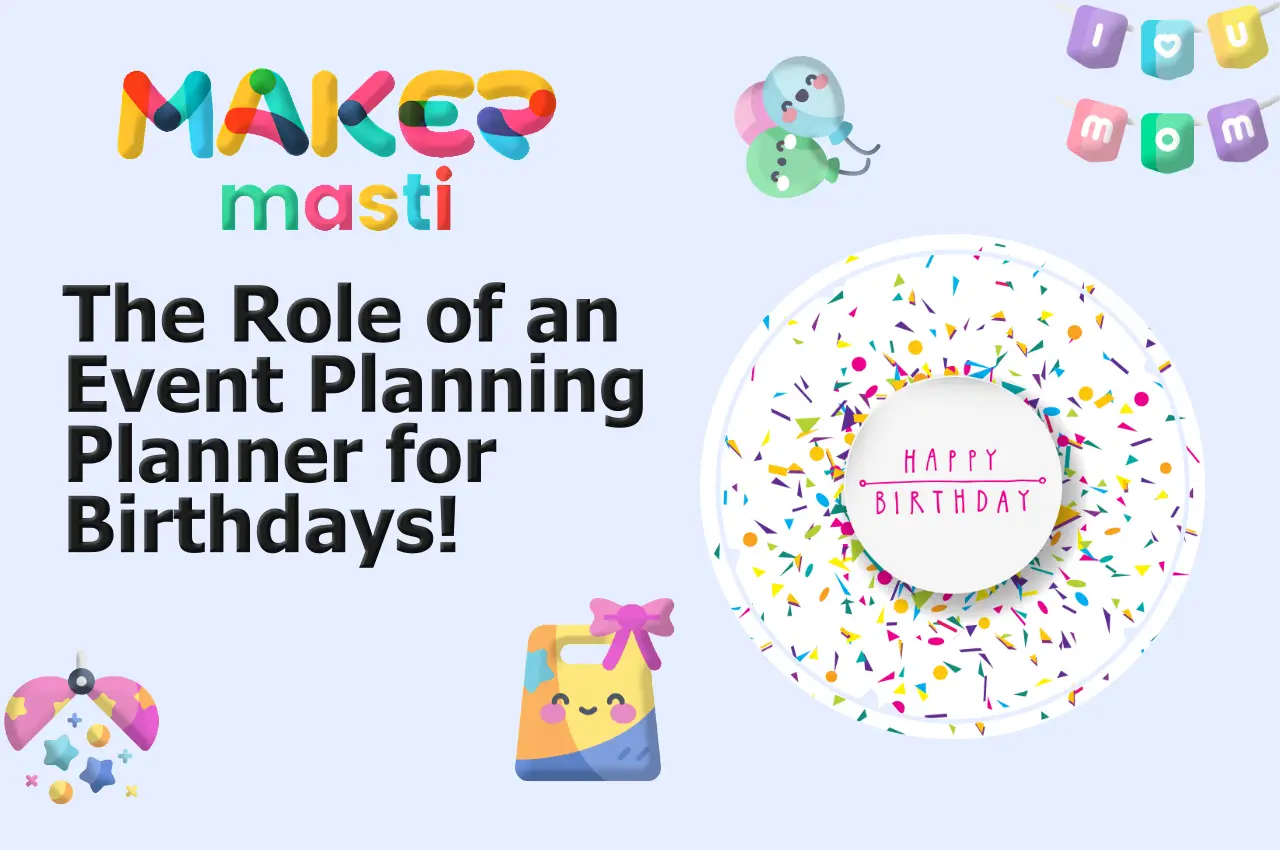Event planning can be stressful for a variety of reasons and an efficient event planning planner will help you with the perfect planning of your event.
- Managing several vendors: Organizing an event frequently entails working with multiple providers, including designers, entertainers, and others. Coordinating schedules, payments, and contracts for various vendors can be difficult, especially if you’re not familiar with the procedure.
- Budget constraints: Staying within a budget is one of the most difficult components of event planning. Balancing finances while still providing an excellent event may be stressful, especially when unforeseen expenses occur.
- Time Management: Planning a good event necessitates balancing multiple duties within a specific timeline. Meeting deadlines, assuring timely delivery of materials, and coordinating setup and teardown all add to the stress, especially for those who already have busy personal or professional lives.
- Attention to Detail: From guest lists and seating arrangements to décor and cuisine, even the tiniest things may have a big impact on an event’s success. Overlooking important details can result in last-minute disasters, adding stress to an already hectic day.
- Unexpected Issues: No matter how carefully you plan, things can go wrong—vendors may cancel, the weather may not cooperate, or equipment may fail. Being prepared for every possibility increases the pressure.
- Pressure to meet expectations: Whether it’s a wedding, corporate event, or birthday party, there is sometimes a lot of pressure to live up to the attendees’ expectations. This can induce tension since you want to make sure the event runs properly and impresses attendees.
- Lack of experience: The logistics of organizing a good event might be overwhelming. A lack of expertise might make it tough to navigate the difficulties of planning and carrying out a faultless event.
- Emotional Pressure: In addition to logistical difficulty, events frequently have emotional significance. Whether you’re arranging a wedding or a milestone celebration, your personal attachment to the event’s success might cause stress.
- Managing Guest Expectations: Ensuring that all guests are satisfied and accommodated, particularly for larger events, can be difficult. From unique dietary requirements to last-minute alterations, managing expectations increases overall stress.
Event planning may be a difficult process because of the numerous moving components, time-sensitive decisions, and high expectations involved. This is why many people hire professional event planners. Professional event planners will take on the strain and ensure a stress-free experience.
What Does an Event Planning Planner Do?

An event planning planner is a specialist who specializes in preparing and carrying out various types of events. Their work entails a wide range of responsibilities designed to ensure that an event runs smoothly and successfully.
1. Initial consultation and needs assessment
- Understanding Client Vision: Event planners begin by meeting with clients to discuss their vision, preferences, and goals for the event. They evaluate the client’s needs and expectations and customize the planning process accordingly.
- Budget Assessment: Planners assist customers in developing a budget and provide guidance on how to properly allocate monies for various areas of the event.
2. Event Concept and Design
- Theme Development: The event planning planner designs a unified theme based on the client’s vision. Planners develop a unified theme or concept for the event, which includes colors, styles, and decorations.
- Customized Solutions: They create unique experiences that represent the client’s personality and preferences, ensuring that every aspect is consistent with the overall goal.
3. Venue Selection and Coordination
- Finding the Perfect Venue: The event planning planner researches and recommends venues that are appropriate for the event’s size, budget, and concept. They frequently have a network of favored venues to make the picking process easier.
- Site Visits: They make site visits to check the venue’s suitability, layout, and facilities, ensuring that they match the event’s needs.
4. Vendor Management
- Vendor Coordination: They keep communication with all vendors ensuring that everyone understands the dates, requirements, and expectations.
5. Logistics and Timeline Management
- Detailed Scheduling: Event planning planners construct detailed schedules that include every phase of the event, from setup to breakdown. This ensures that all jobs are performed on time.
- Logistics Planning: They organize transportation, guest accommodations, equipment rentals, and technical requirements (e.g., sound systems, lighting).
6. Day of Coordination
- On-Site Management: On the day of the event, planners are onsite to oversee all activities and ensure that everything goes as planned.
- Troubleshooting: They manage any unanticipated issues that arise and provide timely answers to keep the event running well.
- Guest Management: Event planners can help create and issue invitations and track RSVPs to efficiently manage guest lists.
- Guest Services: They guarantee that guests are greeted, seated, and taken care of throughout the event, thus improving the overall experience.
7. Post-Event Activities
- Feedback Collection: Gather feedback from clients and guests to assess event success and identify areas for improvement.
- Final Payments and Contracts: They complete payments to vendors and verify that all contractual commitments are fulfilled.
8. Experience and Expertise
- Creative Problem Solving: Event planning planners utilize their experience and creativity to overcome challenges that may occur during the planning process or on the day of the event.
- Knowledge of Trends: They keep up with industry trends. trends, ensuring that events are current, interesting, and relevant.
Benefits of Hiring an Event Planning Planner

Hiring a professional event planning planner can dramatically improve the quality and execution of any event, . Here are several significant advantages:
- Peace of Mind: An event planner is responsible for managing all aspects of the event, allowing clients to enjoy the occasion without worrying about the technicalities.
- Crisis Management: Planners are adept at addressing unexpected situations, guaranteeing a flawless experience even in the midst of adversity.
- Professional Knowledge: Event planning planners have specific training and expertise in planning events, which allows them to anticipate potential issues and plan accordingly.
- Creative Solutions: Their experience allows them to give creative ideas and inventive solutions to clients. They can customize your needs such as a simple birthday decoration, themed birthday celebration, etc.
- Quick turnaround: Experienced planners can complete jobs more efficiently, saving clients significant time during the planning process.
- Delegation of Responsibilities: They manage all logistics, vendor coordination, and communication, freeing up the client’s time for other tasks.
- Vendor Networks: Event planners frequently have established contacts with respected vendors, which can contribute to improved service and, in some cases, lower rates owing to existing agreements.
- Negotiation Power: Their experience negotiating contracts allows them to negotiate advantageous conditions, which can be financially beneficial to clients.
- Cost-Effective Planning: Planners can assist clients in allocating their money properly, and discovering cost-saving opportunities without sacrificing quality.
- Avoiding Costly Mistakes: There is a risk of overspending or making poor financial judgments during the planning phase.
- Thorough Planning: Event planners diligently manage all elements, from guest lists and seating arrangements to décor and timetables, ensuring that nothing is neglected.
- Personalization: They work to learn the client’s preferences in order to provide a personalized experience that is consistent with the client’s vision.
- Troubleshooting: They solve any last-minute issues, allowing clients to enjoy the event uninterrupted.
- Professional Execution: A well-planned event provides a great experience for attendees, making them feel welcome and involved throughout.
- Guest Services: Event planners handle guest logistics, such as hotels and transportation, to ensure that attendees have a smooth experience.
- Evaluation: Gather input from attendees to evaluate the event’s success and make suggestions for future events.
- Final Payments and Vendor Management: They ensure that all suppliers are paid and contractual responsibilities are met, alleviating the client’s burden.
- Celebrating the Occasion: With a professional handling the arrangements, customers can enjoy the occasion and spend quality time with their guests.
- Creating Lasting Memories: By hiring a planner, customers may create memorable experiences without the stress of managing logistics themselves.
Tailoring the Event to Your Vision
When it comes to event planning, every aspect must be in line with your vision to create a memorable experience. An experienced event designer can help you turn your ideas into a cohesive and well-executed event.
- Initial Consultation: Event planners will conduct an in-depth consultation to explore your vision, goals, and preferences. They ask inquiries to determine your expectations, themes, and the general message you wish to portray.
- Clarifying Purpose: Whether it’s a corporate function, wedding, or birthday party, planners help establish the event’s purpose and ensure that every element is in line with your goals.
- Create a unique concept and theme: An event planning planner can build a unique theme based on your input, reflecting your personality and flair. This could include color palettes, patterns, or cultural components that appeal to you.
- Personalized Schedule: Event planners create a specific agenda Plan an agenda that represents your priorities, whether you prefer a formal program or a more relaxed setting.
- Unique Activities: Including activities or entertainment that appeal to your interests, such as interactive games, live performances, or guest speakers, adds a personal touch to the event.
- Tailored Vendor Partnerships: Event planning planners use their network to find vendors who can connect with your vision, such as photographers, florists, or entertainment who match.
- Personalized invites: From creating one-of-a-kind invites to meticulously planning every detail, event planners improve the overall visitor experience by making them feel welcome and valued.
- Thoughtful Guest Services: Tailoring guest services to particular needs, such as personalized seating arrangements or special presents, improves the overall event experience.
- Regular Updates: Throughout the planning phase, event planners have open lines of communication, delivering updates and soliciting feedback to ensure that everything matches your vision.
- Adapting to modifications: Event planners are adept at responding to modifications or last-minute demands, ensuring that your vision is maintained even if revisions are required.
Conclusion
Engaging an event planning planner is a wise investment for anyone wishing to host a really memorable and stress-free event. Their skill in understanding your specific vision, combined with their ability to manage all logistical issues, guarantees that every detail is accomplished successfully. From creating a bespoke concept to organizing vendors and improving visitor experiences, a trained planner brings your ideas to life while relieving you of the planning strain.
Allowing professionals to handle the details allows you to concentrate on what is most important: celebrating the moment with your guests and making lasting memories. Whether you’re planning a wedding, a corporate meeting, or a birthday party, working with a professional event planning planner not only improves the quality of your event but it is transformed into a personalized event that matches your own style and tastes. Trusting an expert with the details allows you to enjoy every second of your special day while knowing that everything is in skilled hands.



